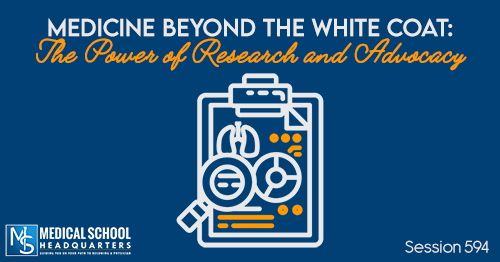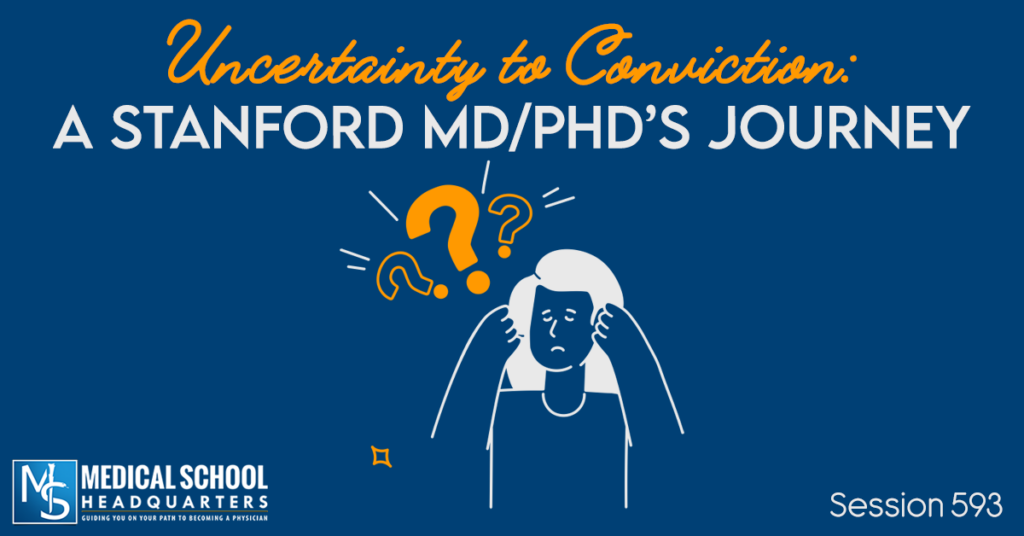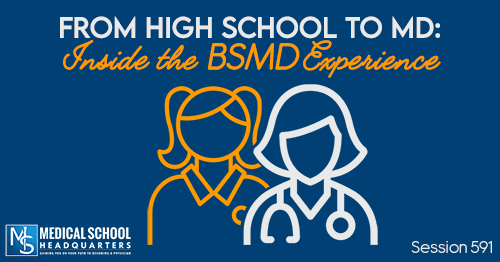A New Voice
The following is a guest post. I reached out to Dr. Lumi St. Claire after reading one of her posts on KevinMD. Her story resonated with me because I don’t think I’m supposed to be “just” a physician either. I enjoy every minute I spend on this site, responding to questions and creating podcasts. All with the ultimate goal of helping the next generation of physician navigate the premed obstacle course, the medical school chaos, and residency.
Medical Burnout
One of the common topics in the news is physician burnout. Stories are posted, research is published, and statistics are thrown around that show how miserable physicians are. It’s said that many would stop if they could, or they wouldn’t do it again if they had the choice. I have my own reservations about the stats, but I’ll reserve those for later.
I specifically wanted Dr. St. Claire to discuss her path to burnout and walking away from the profession she spent so many years preparing for. Now that she’s back working in a clinical environment, she is happier than ever. She discusses what can be done to avoid burnout in medicine, whether that is premed burnout, medical school burnout, or physician burnout.
Avoiding the Burn
As someone who spent 11 years in clinical medicine and ultimately experienced significant burnout, I did a lot of reading about compassion fatigue and physician burnout in hopes of gaining insight into how this happened to me. I found a lot of statistics about medical burnout itself, and I realized that I was (unfortunately) in very good company, as almost half of US physicians self-report as having at least one symptom of serious burnout.
Almost half of US physicians self-report as having at least one symptom of serious burnout.Click To TweetI also found plenty of websites telling me I needed to breathe/eat/sleep/do yoga/take a walk through the park, etc. While it’s true that those things are actually very important in preventing burnout, at the same time I found the advice to be condescending. If it had really been as simple as carving out some “me time” and finding my emotional center, I would have done it.
I spent three years taking a complete break from clinical medicine and working as an educational consultant. Just in the past few months, I have started back as a clinical practitioner in a completely different environment than before. This time around, I absolutely LOVE my job. Which has caused me to reflect even more on exactly why I burned out in the first place.
Job Burnout vs Work Burnout
What I have come to realize, and I think it is an absolutely critical distinction, is there is a very important difference between job burnout and work burnout. In all the reading on burnout I’ve done, I haven’t seen this kind of distinction made. While it’s possible this is a situation that is unique to me, I doubt it. But this is an “n of one” study, so I make no claims that this is peer-reviewed data.
Job burnout is what I suspect comprises the vast majority of physician burnout. Aspects of the job environment prevent you from actually doing the work you trained to do. Things like unmanageably high patient volumes, ever-worsening reimbursement for patient care, inefficient electronic medical record systems, insurance issues, institutional politics, angry bosses, ineffective front desk staff… the list goes on and on. Some of these things you have control over, and some you don’t. It is very important to address the ones you do and do something about them if they are making your life unbearable.
Work burnout, on the other hand, is unhappiness with the actual work description that is your career. This is when you find that the work you trained to do isn’t a good fit for you, and may actually make you frankly miserable. Work burnout does not respond to relaxation techniques, schedule adjustments, or salary modifications. If what you do makes you unhappy, there is no real way of getting around that except to deal with it head on and figure out, practically, what it is it that you really want to be doing.
For me, it took me years to realize that I suffered from both kinds of burnout simultaneously, which made for some pretty spectacular fireworks. While it only took me a few years to realize that my place of employment wasn’t healthy, it took over a decade for me to acknowledge that being a primary care practitioner wasn’t for me, no matter how good at it I was.
Avoiding Burnout in Medicine
The good news is that, because I was able to address both issues, I didn’t just jump back into the same work in a different environment only to find myself miserable again. I revamped my medical career as a specialist in a new environment, and now I find myself doing exactly what I want to be doing, with the support of a caring and respectful department behind me.
The even BETTER news is that I believe there are techniques for warding off burnout early in the medical education process. Medical school burnout is a very real thing. In a 2010 JAMA study, more than half of responding medical students from multiple schools self-reported burnout.
In a 2010 JAMA study, more than half of responding medical students from multiple schools self-reported burnout.Click To TweetWith burnout not just limited to practicing physicians but infiltrating the ranks of physicians-in-training, we face a very real potential physician shortage in this country. But there are things you can consider in the application process, as well as during medical school itself, to help avoid burnout.
Applying for Medical School
1. Consider subject blocks vs systems education. It is important to recognize that the medical education information is generally the same no matter what AAMC-accredited school you attend. How the information is taught is what makes a big difference.
It’s incredibly helpful to know your learning style before you apply and really do your homework on how individual medical schools approach the curriculum (i.e. “block” systems taught according to subject vs integrated systems educations that provide learning by body system.) Picking a school that fits you is critical not only to succeeding but enjoying the experience!
It’s incredibly helpful to know your learning style before you apply to medical school and really do your homework on how individual schools approach the curriculum.Click To Tweet2. Consider the school’s environment. Some people could study medicine in a cave in the middle of winter. I am not one of those people. I am extremely environmentally sensitive, and I knew that about myself going into the medical school application process. I ended up going to a medical school that was on a beautiful campus at the foot of the Blue Ridge Mountains.
I knew the minute I set foot on grounds for my interview that I wanted to be there. I was also accepted to several other medical schools with great reputations but were plunked down in the middle of gray, concrete cities. They just weren’t for me. Sometimes you really have to trust your gut, knowing of course, that your gut mostly has s**t for brains.
3. Consider the school’s cost. This is a hard one, because the decision to attend a more expensive school doesn’t have a tremendous immediate impact, as long as you can get enough financial aid to cover you. But the cost of your school can have a significant impact on the career decisions you make later down the road in order to pay back your educational debt. Especially if you are considering a care in primary care, which traditionally is not nearly as well compensated as specialty medicine.
The cost of your medical school can have a significant impact on the career decisions you make later down the road in order to pay back your debt.Click To TweetI had more than a few friends in medical school who felt that they didn’t have the flexibility to choose the residencies they really wanted. They felt pressed to go into a specialty that wasn’t their first choice because of the financial pressure to pay off their enormous loans before they died.
4. Make sure you have some volunteer clinical experience. Most med schools will require some form of real-world experience anyway, but working in a lab, while important and fascinating, won’t help you make any decisions about the practice of clinical medicine.
And whether your experience is good or bad, that’s still helpful information, and you can learn a lot by dissecting why you had the experience you did. Was it a single person that made it so inspiring or so negative? (This can be misleading either way—there are both diamonds and rotten apples in every field, and both can skew your perception of the field itself.) Were there specific environmental issues (i.e. was the physical plant run down?) How did the majority of staff who worked there come across?
I’ve found in my own experience that healthy systems tend to have happy employees across the board, and vice versa. If everyone is happy and productive in an environment, and you are still loathing your experience, it’s possible that a clinical career may simply not be the best fit for you.
Avoiding Medical School Burnout
1. Starting medical school is a bit of a culture shock. Simply put, everyone in medical school is smart. Really, really smart. If you came from a small college where you were at the top of your class without breaking a sweat, get ready to move up to the big leagues. Some of the people in your class are absolute geniuses. (There was one guy in my class who was so bored during lecture, he would do not one, but two crossword puzzles at the same time. And of course, he got straight A’s.)
The really important point is not to use your classmates’ study habits as a guide for yours. You need to figure out early on what works for you and stick with it. Just because your friend is going out to a bar at 11 pm the night before the big anatomy midterm doesn’t mean you should. (If you are one of those freakish people who can and still ace your exam the next morning, by all means, have a couple of beers for me.)
Don't use your classmates’ study habits as a guide for yours. You need to figure out early on what works for you and stick with it.Click To Tweet2. The expectation of achieving perfection can drive burnout. There is tremendous pressure in medicine to be perfect—or at least come close. We all want to know as much as possible so we can do right by our patients. But trying to do more and more studying at the expense of eating right, exercising, and getting enough sleep leaves you less able to study effectively.
It’s a balancing act, and honestly, a lot of it is trial and error. But maintaining your status as a human being is pretty important. You will see plenty of classmates that forget that fact the minute their first class begins.
Burnout in medical school does not occur in a vacuum–it can have serious implications for patient care (see the JAMA study). You owe it to yourself and your patients to work healthy.
3. Don’t be married to the idea of a career field before you experience it. I have seen far too many people enter medical school swearing on their lives that they are going to be a _______ (fill in the blank) physician. And then 10 years later and several hundred thousand dollars in debt, they find themselves trying to negotiate a specialty change.
Use your 3rd-year clinical rotations and 4th-year electives to get a sense of what you want to do. I strongly encourage doing at least one AI, or Acting Internship (some schools call these Sub I’s) during your 4th year. This is when you will essentially be functioning with the autonomy of an intern, and will be following the same schedule and call as an intern (pager included).
Some of the worst advice I got from a very well-intentioned mentor at my medical school was to avoid doing AIs and “just have fun with your 4th-year electives because you’re not going to have a lot of flexibility once your intern year starts.” While I had a truly spectacular 4th-year experience, it made for a very rocky transition into my residency, which I genuinely believe could have been much improved had I done some AIs and knew better what was coming.
For more reading about medical burnout, visit Dr. Dike Drummond’s website, The Happy MD, where he blogs extensively on physician burnout and techniques to deal with it. Or listen to the interview with him on Session 47 of The Premed Years!
Primum non nocere…..
~Lumi
Links and Other Resources
- Dr. St. Claire’s article at KevinMD about being “just” a physician.
- Related episode: A Burnout Story and What You Can Do to Avoid It
- Related episode: Avoiding Burnout as a Premed, Med Student, and Beyond
- Need MCAT Prep? Save on tutoring, classes, and full-length practice tests by using promo code “MSHQ” at Blueprint MCAT (formerly Next Step Test Prep)!






